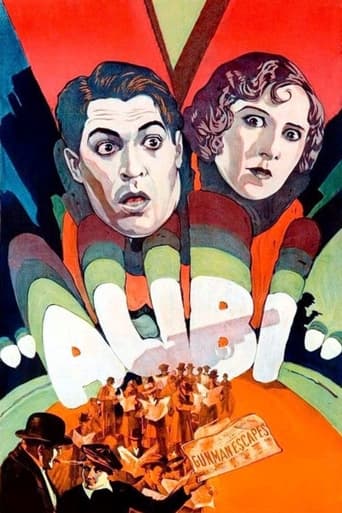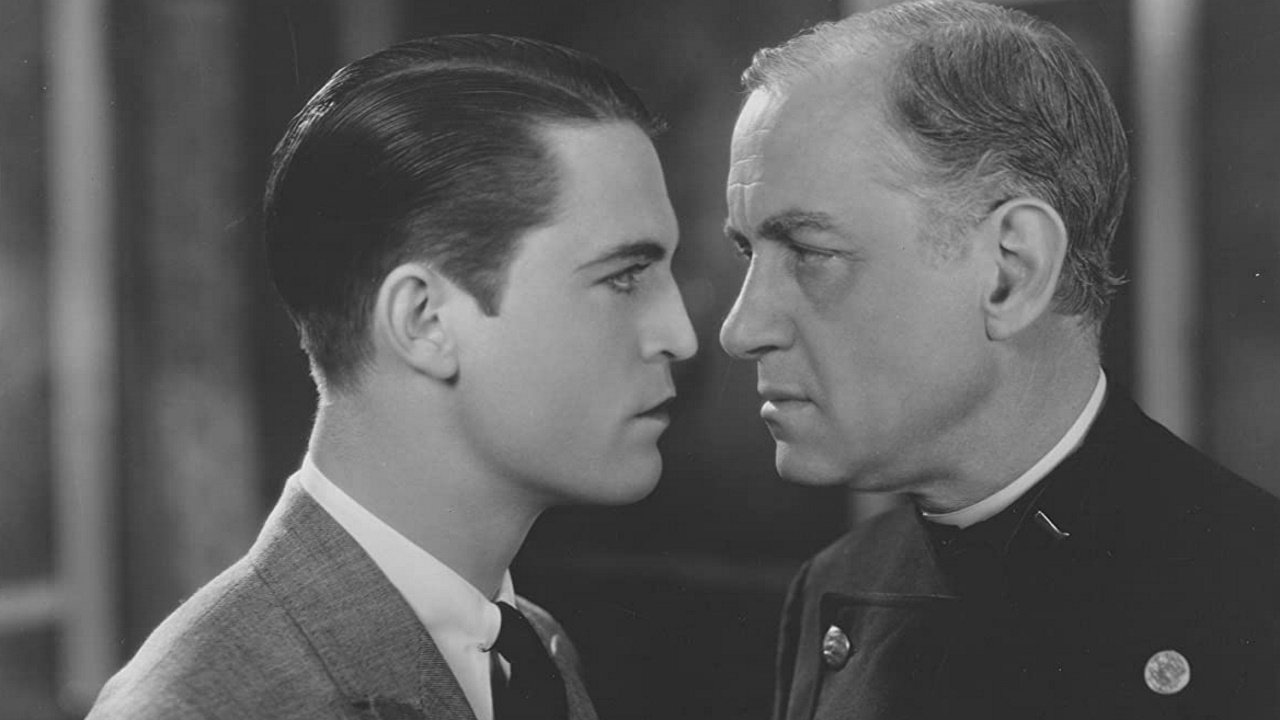anwarul210
Dire. When the first scene of the movie is a tracking shot to a line of chorus girls and eventually focuses on the most inept dancer you have ever seen, you know it's downhill from here. This talentless, ham-fisted, frumpy cow actually has a supporting role, which sets the bar very low for everyone else. However, they still manage to demolish any semblance of good acting. Chester Morris, who plays the gangster, is horrendous. As cardboard as the stage sets, he alternates between smugness and a perpetual scowl for most of the movie. At the end when his alibi is disproven, his personality completely changes unbelievably and he turns into a whimpering sap. The scene where he thinks he has been shot by the police and collapses on the floor is hysterical, as well as his actual death scene. On the topic of death scenes, a shout out has to go to Regis Toomey. Irritating throughout, his death scene has to be the longest ever put to film that I ended up shouting, "just die, already!" at him.The story itself may have been interesting for an easily-entertained 1929 audience, but with so many coincidences and implausible moments, as well as being boring, clichéd and dull, I was wishing this 91 minute masterpiece of crap was only 91 seconds long. This was nominated for Best Picture and Best Actor for Chester Morris. I despair.
Jay Raskin
The acting is mainly from the silent film era, but the fact that it is a sound film actually makes it quite interesting. The film is pre-Hayes Code and is startling in its violence. I don't think it was until 1937 and "Petrified Forest" (Humphrey Bogart) and 1951 "White Heat" (James Cagney)that such a psychopathic criminal was on screen. I don't think it was until 1970 and "Dirty Harry" (Clint Eastwood) that such a anger-filled cop was shown. The way the police are shown threatening to shoot a suspect and make it look like an attempted escape, really makes one see the need for Miranda Rights for suspects, something that didn't exist in 1929.The lead performances by Regis Toomey and Chester Morris are memorable. This was Morris' first starring role and he went on to star in nearly 50 films over the next 10 years. In the 1940's he starred 14 times in the detective movie series "Boston Blackie". He did around 45 television shows in the 1950's and 60's.This was Regis Toomey's first movie. He went on to star in some 25 movies over the next 5 years, before becoming one of Hollywood's most dependable supporting character actors in some 150 more films into the 1950's, often playing police detectives. He was in such classics as "His Girl Friday," "Meet John Doe," "Spellbound," and "Mighty Joe Young." He went on to appear on over 100 television shows from the 1950's to the 1980's. He costarred with Gene Barry in "Burke's Law" for three years in the 1960's.Director Roland West did just two more films the following years starring Morris, "the Bat Whispers" and "Corsair." Unfortunately, he apparently became involved with real life gangsters and was involved in the tragic death of actress Thelma Todd, which abruptly ended his career. He shows a nice unique style here, with sequences of fluid camera movement inter-cut with quite static shots, a little like James Whale. It is quite similar to the other movies I have seen by him "The Bat" and "The Bat Whispers". If he had continued with films, he might be considered a great auteur today.This is a must see for cinema buffs and especially lovers of gangster films.
sddavis63
The story here is interesting enough and on its own ensures that no one will feel disappointed at having watched this. Chick Weaver is a gangster just released from prison who hooks up with a "copper's daughter." Unfortunately, he can't go straight and gets involved with a warehouse robbery during which he kills a cop. The rest of the movie essentially deals with his attempts to frame an alibi for himself and with the efforts of the police to find the cop-killer. There are a few points at which the story gets a bit confusing, but it holds your interest well enough as you follow the various characters. What's really most interesting about this, though, is its status as a very early "talkie."In that sense, I almost saw this serving as a proverbial "missing link" between the silent era and the sound era. There are parts of this movie which are very much like a silent movie - with no dialogue or sound effects other than a musical background. And yet, most of the movie has dialogue, although strangely the accompanying sound effects (ie, the sound of doors slamming, etc.) often seem to be missing. At times, this movie even has, in both sound and picture quality, a very later (say 1950's) feel to it. This diversity of "style" (for lack of a better word) would seem to me to be an example of director Roland West experimenting with this new way of movie-making. The weirdest aspect of this would probably be an extended scene right at the beginning of the movie, where police officers do nothing but bang their billy clubs against a wall for no apparent purpose - except, perhaps, to demonstrate to the audience that this has sound?This is an enjoyable enough movie, and an interesting look at this transitional era of movie-making. 7/10
MARIO GAUCI
Having become a fan of director West via the ‘old dark house’-type comedy-thriller THE BAT WHISPERS (1930), I looked forward to watching every ‘new’ film of his – in the intervening years since that first viewing of BAT (on the eve of the Millennium, no less!), I had only managed to catch up with the somewhat unsatisfactory Lon Chaney vehicle THE MONSTER (1925) but, now, in quick succession came the original Silent version of THE BAT (1926) and ALIBI (1929), his first Talkie (notable for its innovative early Sound technique).The latter is a gangster melodrama (a genre pioneered by Josef von Sternberg’s UNDERWORLD [1927]) whose quality was even recognized by the Academy of Motion Picture Arts and Sciences, where it was in the running for three Oscars – Best Picture, Best Actor (forgotten star Chester Morris) and Best Art Direction (by the renowned William Cameron Menzies). While there are many who now look at it merely as a curio – and there’s no denying that its chief interest, after all these years, remains West’s artistic approach to the medium (extending also to camera position and movement, editing, and set design) – I found the plot itself, simple and moralistic though it is, reasonably absorbing.Morris has just been released from prison and, while resuming his criminal activities, conveniently hitches up with a policeman’s daughter – she’s obviously naïve and speaks up for him when confronted with a murder rap. An undercover agent (Regis Toomey – who, feigning a drunken act, starts off by being obnoxious but eventually proves both hero and martyr) is ironically called upon to provide an alibi for Morris…but the girl unwittingly blows his cover and, inevitably, spells the man’s doom (bafflingly, West even places unwarranted emphasis on his overlong and maudlin death scene!). Eventually cornered in the top-floor of a high-rise, Morris breaks down before the cop who had been his rival for the heroine’s affections, revealing his true color (the star’s performance – alternating between smugness and a perpetual scowl – hadn’t been particularly distinguished up to that point, but he effectively shows his range here: his come-uppance, then, is truly incredible and unexpected). Also worth mentioning is the film’s unflinching brutality: Morris’ associate, the ageing owner of a popular establishment, has a tempestuous relationship with his “dizzy” moll (played by Mae Busch, frequent foil for the comic duo of Laurel & Hardy) and, at one point, he pushes her and she bashes her head against a cabinet!; later on in the scene, it’s he who gets thrown clear across the room by a punch from an enraged Morris.Having just read the “DVD Talk” and “Slant Magazine” reviewers’ comments on the film, I’m not sure I agree completely – perhaps because I knew beforehand Morris would be playing a crook – with their contention that the line between hero and villain is deliberately blurred (in view of the Police’s objectionable methods, particularly a scene in which a captured member of Morris’ gang is literally terrorized into a confession) and even arguing that the gangster is initially depicted as sympathetic (his stretch in jail having apparently been the result of a frame-up). However, I got the impression that the Police were required to be tough in order to effectively meet the gangsters’ wave of lawlessness and violence (note how the cops stick together when a colleague of theirs is callously slain during a robbery, with the synchronized rapping of police clubs – the film was, in fact, based on a play called “Nightstick” – unleashing a dragnet over the whole area in a matter of seconds). Incidentally, an inspired way to further showcase the new-fangled Sound system was by throwing in a handful of ‘static’ musical numbers during the nightclub sequences! That said, the quality of the “restored” audio was frankly quite horrid – with dialogue often too low to grasp or else being drowned out by extensive crackling on the soundtrack, and even dropping out entirely for a few seconds a couple of times! While nowhere near as distracting, the DVD transfer does display occasional combing; for some reason, too, the opening credits of the film have been digitally recreated!


 AD
AD


